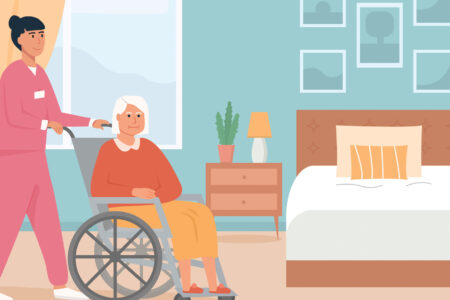
In my work at Providence Health Care in British Columbia I have seen how our organization has come to be at the forefront of how a Catholic hospital might respond to MAID. Like many Catholic and other faith-based health care providers across Canada, Providence has found itself in the news over this service.
MAID is a controversial, deeply personal and divisive issue. It raises fundamental moral, philosophical and religious questions about the goals of medicine, personal and institutional conscientious objection, and whether one should ever intentionally end a life. These are questions of societal importance that go beyond religious circles. Some faith-based care centres do permit and provide MAID, while some secular sites object to it. Recently, the Delta Hospice Society in British Columbia claimed MAID goes against its understanding of the philosophy of hospice.
A recent Angus Reid poll specifically asked whether a faith-based institution should have the option to refuse to provide MAID. For obvious reasons, it caught my attention. The poll asked responders to consider the following options in relation to long-term care centres/homes: “Setting aside your own views on assisted dying for a moment, do you think a religiously affiliated nursing home should [1] Be able to say no on moral grounds and patients who want a doctor-assisted death would be moved to another facility or [2] Be required by law to allow these procedures at their facilities?”
The question should have been even more specific: the pollsters did not differentiate between privately and publicly funded nursing homes, and not all nursing homes, religiously affiliated or not, are publicly funded. Furthermore, it is not widely known that currently there are no federal or provincial laws mandating such procedures in faith-based facilities.
Taking into account these limitations, the poll results remain valuable. More than half the respondents (55 percent) said religiously affiliated nursing homes should be allowed to not provide MAID and to move patients wishing MAID to another facility, while 45 percent believed that religiously affiliated nursing homes should be required by law to allow MAID to be performed in their facilities.
Given that a significant majorityof Canadians — in fact, 79 percent — moderately to strongly support assisted dying, it is interesting that these poll numbers on what a nursing home ought to do are virtually split down the middle.
What, then, are Canadians living in a pluralistic society to do? While there may yet be legal and Charter challenges, as well as further changes to the existing law, the poll’s split opinion does provide some critical context for future social and policy considerations concerning MAID in publicly funded faith-based health care.
In considering the social context, it is critical to remember the history of our health care system. There was a time when faith-based providers were not publicly funded. With the introduction of medicare in 1966, Canada’s newly socialized medical system built upon the pioneering work and private funding of religious groups, often Catholic sisters, who had helped create Canada’s original health care infrastructure. This historical legacy is one of the important contributions faith-based institutions have made to Canadian health care.
The critical question now is whether the publicly funded faith-based sector can continue to contribute to health care today. Two things are worth considering. First, publicly funded faith-based health care in the provinces/territories is usually managed by mutually agreed-upon social contracts. Typically, these take the form of a service agreement or memorandum of understanding between provinces/territories (and/or their delegates or health authorities) and faith-based providers. These agreements usually come with exit clauses, which means that, with notice, either party can end the relationship.
Such agreements include obvious expectations, such as that these facilities will provide health care that matches national and provincial standards of quality. They also permit faith-based providers to continue to have, as stated in British Columbia’s master agreement, the “right to own, manage, operate and conduct the affairs of their respective facilities and to carry out their respective religious missions.” This is why those facilities identified in the agreement do not have to offer services incompatible with their mission (abortion in Catholic hospitals, for example).
Second, while it is accurate to say that certain faith-based health providers will not provide MAID in their facilities, their current contributions to the health of all citizens are certainly extensive. For example, Providence Health Care is a world leader with its Centre for Excellence in HIV/AIDS. Providence is also leading the innovative BC Centre on Substance Use, which is active in combatting the opioid crisis. In other words, the mission of faith-based organizations is much more than what they don’t do. In the context of MAID, Providence’s mission lens also means focusing on what is provided (excellent palliative care) rather than what is not provided (MAID).
Given the amazing strengths of many publicly funded faith-based providers and the added value the public gets from them, another way to look at the poll data is to see them as reflecting Canada’s diversity. Such a policy approach to MAID builds on the fact that secular and faith-based health care providers already work together in what is an increasingly integrated system, capitalizing on each other’s strengths. The reality is that patients are often transferred between sites to benefit from the unique expertise and capacity of each of the partners.
Of course, transfers of care for MAID must not be onerous, nor should they impose undue hardship on patients and families. Finding workable solutions has certainly been Providence’s practice when it comes to managing requests for MAID when they occur — and they do — in our Catholic sites.
Providence’s strong partnership with the Vancouver Coastal Health Authority now permits organized and smooth transitions for persons wishing to further explore MAID as a choice, or for those wishing to seek alternatives such as hospital palliative care units and/or hospice. Secular and faith-based organizations can work together to resolve these concerns.
The question of whether MAID must be provided on-site in every health care facility is not the only starting point for social policy deliberation about faith-based providers, especially when these providers reflect Canadian society’s diversity and bring added value to the health care of all Canadians.
Photo: Shutterstock, by sfam photo.
Do you have something to say about the article you just read? Be part of the Policy Options discussion, and send in your own submission. Here is a link on how to do it. | Souhaitez-vous réagir à cet article ? Joignez-vous aux débats d’Options politiques et soumettez-nous votre texte en suivant ces directives.








